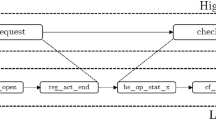Abstract
The increasing complexity of business processes in the era of e-business has heightened the need for workflow verification tools. However, workflow verification remains an open and challenging research area. As an indication, most of commercial workflow management systems do not yet provide workflow designers with formal workflow verification tools. We propose a logic-based verification method that is based on a well-known formalism, i.e., propositional logic. Our logic-based workflow verification approach has distinct advantages such as its rigorous yet simplistic logical formalism and its ability to handle generic activity-based process models. In this paper, we present the theoretical framework for applying propositional logic to workflow verification and demonstrate that logic-based workflow verification is capable of detecting process anomalies in workflow models.
Similar content being viewed by others
References
W.M.P. van der Aalst, Verification of workflow nets, in: The 18th International Conference on Application and Theory of Petri Nets, Lecture Notes in Computer Science, Vol. 1248 (1997) pp. 407-426.
W.M.P. van der Aalst, The application of Petri nets to workflow management, Journal of Circuits, Systems and Computers 8(1) (1998) 21-66.
W.M.P. van der Aalst, Three good reasons for using a Petri-net-based workflow management system, Information and Process Integration in Enterprises: Rethinking Documents (Kluwer Academic, Dordrecht, 1999) pp. 161-182.
W.M.P. van der Aalst and Arthur H.M. ter Hofstede, Verification of workflow task structures: A Petrinet-based approach, Information Systems 25(1) (2000) 43-69.
N.R. Adam, V. Atluri and W.K. Huang, Modeling and analysis of workflows using Petri nets, Journal of Intelligent Information Systems 10(2) (1998) 131-158.
Y. Choi and J.L. Zhao, Matrix-based abstraction and verification for e-business processes, in: Proceedings of the 1st Workshop on e-Business (2002).
Y. Choi and J.L. Zhao, Handling cycles in workflow verification by feedback identification and partition, in: Proceedings of the 2003 International Conference on Information and Knowledge Engineering, Las Vegas, NV (June 23-26, 2003).
D. Georgakopoulos, M. Hornick and A. Sheth, An overview of workflow management: From process modeling to workflow automation infrastructure, Distributed and Parallel Databases 3(2) (1995) 119-153.
A.M. Law and D. Kelton, Simulation Modeling and Analysis, 3rd edn. (McGraw-Hill Higher Education, 2000).
T. Maruta, S. Onoda, Y. Ikkai, T. Kobayashi and N. Komoda, A deadlock detection algorithm for business processes workflow models, in: IEEE International Conference on Systems, Man, and Cybernetics, Vol. 1 (11-14 October 1998) pp. 611-616.
T. Murata, Petri nets: Properties, analysis and applications, Proceedings of the IEEE 77(4) (1989) 541-580.
J. Nolt, D. Rohatyn and A. Varzi, Schaum's Outline of Logic, 2nd edn. (McGraw-Hill, 1998).
W. Sadiq and M.E. Orlowska, Analyzing process models using graph reduction techniques, Information Systems 25(2) (2000) 117-134.
M. Sipser, Introduction to the Theory of Computation (PWS, 1997).
E.A. Stohr and J.L. Zhao, Workflow automation: Overview and research issues, Information Systems Frontiers: Special Issue on Workflow Automation 3(3) (2001) 281-296.
WfMC, Workflow management coalition terminology & glossary (WFMC-TC-1011, Issue 3.0)q, Workflow Management Coalition (1999).
D. Wodtke, J. Weißenfels, G. Weikum, A. Kotz Dittrich and P. Muth, The MENTOR workbench for enterprise-wide workflow management, in: SIGMOD Conference (1997) pp. 576-579.
Author information
Authors and Affiliations
Corresponding author
Rights and permissions
About this article
Cite this article
Bi, H.H., Zhao, J.L. Applying Propositional Logic to Workflow Verification. Information Technology and Management 5, 293–318 (2004). https://doi.org/10.1023/B:ITEM.0000031583.16306.0f
Issue Date:
DOI: https://doi.org/10.1023/B:ITEM.0000031583.16306.0f




